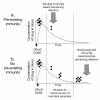The promise and potential challenges of intermittent preventive treatment for malaria in infants (IPTi)
- PMID: 16033653
- PMCID: PMC1193983
- DOI: 10.1186/1475-2875-4-33
The promise and potential challenges of intermittent preventive treatment for malaria in infants (IPTi)
Abstract
Intermittent preventive treatment (IPT) administers a full therapeutic course of an anti-malarial drug at predetermined intervals, regardless of infection or disease status. It is recommended by the World Health Organization (WHO) for protecting pregnant women from the adverse effects of malaria (IPTp) and shows great potential as a strategy for reducing illness from malaria during infancy (IPTi). Administered concurrently with standard immunizations, IPTi is expected to reduce the frequency of clinical disease, but to allow blood-stage infections to occur between treatments, thus allowing parasite-specific immunity to develop. While wide deployment of IPTi is being considered, it is important to assess other potential effects. Transmission conditions, drug choice and administration schedule will likely affect the possibility of post-treatment rebound in child morbidity and mortality and the increased spread of parasite drug resistance and should be considered when implementing IPTi.
Figures





References
-
- Verhoeff FH, Brabin BJ, Chimsuku L, Kazembe P, Russell WB, Broadhead RL. An evaluation of the effects of intermittent sulfadoxine-pyrimethamine treatment in pregnancy on parasite clearance and risk of low birthweight in rural Malawi. Ann Trop Med Parasitol. 1998;92:141–150. doi: 10.1080/00034989859979. - DOI - PubMed
-
- Parise ME, Ayisi JG, Nahlen BL, Schultz LJ, Roberts JM, Misore A, Muga R, Oloo AJ, Steketee RW. Efficacy of sulfadoxlne-pyrimethamine for prevention of placental malaria in an area of Kenya with a high prevalence of malaria and human immunodeficiency virus infection. Am J Trop Med Hyg. 1998;59:813–822. - PubMed
-
- van Eijk AM, Ayisi JG, ter Kuile FO, Otieno JA, Misore AO, Odondi JO, Rosen DH, Kager PA, Steketee RW, Nahlen BL. Effectiveness of intermittent preventive treatment with sulphadoxine-pyrimethamine for control of malaria in pregnancy in western Kenya: a hospital-based study. Trop Med Int Health. 2004;9:351–360. doi: 10.1111/j.1365-3156.2004.01196.x. - DOI - PubMed
Publication types
MeSH terms
Substances
Grants and funding
LinkOut - more resources
Full Text Sources
Medical

